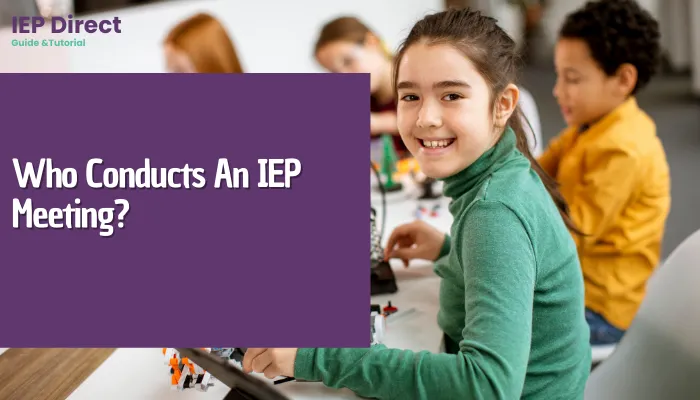Parents and guardians should know who conducts an IEP meeting. This article will explore the importance of understanding the roles of various individuals involved in an IEP direct, as well as who actually facilitates the process.

Who Conducts An IEP Meeting: Main Participants
So, we have now established that who conducts an IEP meeting is crucial. Let us dig deeper into those key players who make it happen.
The IEP Team Leader
Who conducts these meetings? Very often, it is the leader of the team preparing for the Individual Education Program. But what do we know about them?
The captain on this ship is essentially known as the ‘IEP Team Leader’. They are steering the session and making sure that everyone speaks out and everything remains in order.
Role And Responsibilities Of The IEP Team Leader
The IEP Team Leader plays a crucial role in organizing and guiding an IEP meeting for student success.
- Facilitating a Meeting: Keeping conversation flowing smoothly, managing time effectively, ensuring each one contributes.
- Gathering Relevant Information: Getting input from different members about student’s strong and weak points.
- Setting Goals: A clear meeting agenda should be developed and circulated prior to any such meeting.
- Ensuring Compliance with Legal Standards: Ensuring compliance with all legal requirements by reviewing whether or not every child’s program complies with law.
Therefore, Understanding the IEP Team Leader’s responsibilities ensures effective meetings, compliance, and tailored goals for each student’s educational needs.
The Importance Of Their Role
A good leader of the team preparing for Individual Education Program has several reasons to be crucial.
Here are some point:
- Organization: They keep it focused and productive.
- Fairness: Allowing everybody to speak their mind.
- Expertise: Deep knowledge base regarding special education laws/procedures.
Therefore, A skilled IEP Team Leader ensures effective meetings through strong organization, fairness, and expertise, fostering productive and compliant IEP development.
The Special Education Teacher
The special educator is an important member of any team preparing for the Individualized Education Program. Their insights regarding the unique needs of the student help in developing and executing the IEP.
The Special Education Teacher plays a pivotal role in crafting and executing the IEP, from assessing student needs to monitoring progress.
- Assessing Student Needs: Conducting evaluations and observations to identify a student’s strengths and weaknesses.
- Developing Goals for IEP: Making goals that are measurable and address individual needs of students.
- Specialized Instruction Provision: Delivering instruction that is specifically designed according to the student’s learning style and abilities.
- Monitoring Student Progress: Checking on how far the student is moving towards achieving their IEP goals.
By evaluating, setting goals, providing tailored instruction, and tracking progress, the Special Education Teacher ensures the IEP effectively supports each student’s unique educational journey.
The Role Of Their Input in Understanding Needs
The Special Education Teacher provides important information on how the child learns best, their areas of difficulty, with an emphasis on what they can do. These professionals play a significant part in coming up with an appropriate individualized educational program that meets the unique requirements of a learner.
So while the IEP Team Leader might be considered as captain of this ship, the Special Education Teacher plays the role of navigator who determines where exactly the ship will go.
The General Education Teacher
Recall our discussion about the special educator being a navigator in this Individualized Educational Program (IEP) boat? Well, it is appropriate to refer to him or her as just another tour guide who knows all the secrets about who conducts an IEP meeting.
This person knows everything about this classroom, which makes any comments from them quite valuable.
Role Of The General Education Teacher
Through an IEP meeting, general education teachers provide some insight into what goes on during daily class work. This role offers different viewpoints showing how this learner behaves like others under ordinary teaching conditions.
- Academic Progress: How well does the student meet grade-level standards? Are there subjects where they do particularly better or worse?
- Social Interaction: What is the student’s relationship with peers like? Does the student have any social deficits or strengths?
- Behavioral Observations: Any behaviors that are affecting learning—either positive or negative?
- Classroom Accommodations: Which accommodations and modifications are in place now, and how effective are they?
Therefore, through sharing this information, the General Education Teacher helps to develop a complete picture of the child’s strong areas, weak points, and what he/she needs.
Contributions From General Education Teachers
The importance of General Education Teachers’ input can be seen through several reasons
For Example:
- Collaboration: Through their input, special education teachers can work together with general educators.
- Individualized Education: The insights provided by them help in creating an Individualized Educational Program (IEP) that meets unique requirements of each particular child.
- Inclusion: Their involvement promotes inclusion as it enables the student to access a regular classroom curriculum.
Therefore, IEPs are meant to make students successful in school.
Key Players In The IEP Process
We’ve discussed some key members of the IEP team, however, there are still a few integral roles to consider.
Now let us discuss professionals who assess students’ needs and invaluable inputs from parents in relation to who conducts an IEP meeting.
School Psychologist Or Counselor
School psychologists or counselors perform functions vital for understanding the overall health of children at school. They bring something different to this team.
In this next section I have explained about assessing students needs and progress, make sure to check out:
Assessing Students Needs And Progress
Assessing students’ needs involves psychological evaluations, behavioral assessments, academic assessment, and progress monitoring to tailor effective IEP adjustments.
To understand better everything has been explained in detail:
- Psychological Evaluations: Conducting tests to identify cognitive, emotional, and social-emotional strengths and weaknesses.
- Behavioral Assessments: Observing and analyzing student behavior to determine underlying causes.
- Academic Assessment: Contributing to the understanding of the student’s learning style and academic performance.
- Progress Monitoring: Tracking the student’s progress over time and making recommendations for adjustments to the IEP.
Effective IEP adjustments rely on thorough psychological evaluations, behavioral assessments, academic assessments, and continuous progress monitoring to support student success.
Value Of The School Psychologists Input
School psychologists or counselors have a lot of information concerning students’ functioning in general. Therefore, their knowledge helps in creating targeted accommodations and interventions for IEP teams.
Therefore, School psychologists or counselors provide essential insights into students’ overall well-being. Their detailed assessments and evaluations are crucial for creating effective IEP adjustments that support student success and development.
Parents Or Guardians: Central To The IEP
Parents are responsible for all decisions that affect their children’s lives. Their participation in the process is essential for the successful implementation of an Individual Education Program (IEP) and understanding who conducts an IEP meeting.
Providing Essential Information About The Student
Parents play a vital role in an IEP meeting by providing valuable insights, communicating with professionals, and advocating for their child’s needs to ensure a successful educational plan.
- Sharing Insights: Giving viewpoints on student’s strong suits, challenges they face, as well as things that appeal to them most.
- Communicating with Professionals: Bridging the home-school communication gap.
- Advocating for the Student: Ensuring that such needs are met.
By sharing insights, bridging communication gaps, and advocating for their child, parents significantly contribute to creating an effective IEP that addresses the student’s unique needs.
Involvement In Decision Making
Parents play an active role during an IEP meeting.
They contribute through:
- Setting Goals: Collaborating with the team to establish achievable and meaningful goals.
- Making Decisions: Providing feedback on proposed accommodations and modifications.
- Evaluating Progress: Monitoring child’s progress while making necessary changes in an IEP plan.
Therefore, do not forget that an IEP requires a combined effort of different experts. Other players who are involved in the education process have a significant bearing on student success.
Conclusion
In this blog we have covered about who conducts an IEP meeting while leading an IEP team meeting may be done by an IEP Team Leader usually, all participants play vital roles. Teachers, parents, and other professionals provide insights into the student’s needs. Collaboration is key.
However, some occasions call for participation by students too. Ultimately they produce a meaningful IEP that suits the child’s special learning style.
Communication should never break down between the teacher and parents because it determines how far the student goes in terms of progress with time.
